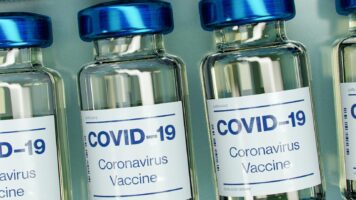COVID-19 News
COVID-19 Update | May 19, 2023
May 19, 2023

COVID-19 Update | May 19, 2023
The California Biotechnology Foundation is committed to keeping you up to date about COVID-19 testing, treatment and prevention advancements. The following resources track what progress has been made as of May 19, 2023. Notable advancements include:
- According to a study published in Brain Communications, new research could potentially improve the treatment of fatigue among individuals with long COVID-19.
- The World Health Organization, announced that the vaccine advisory group stated current COVID vaccines should be switched to a monovalent vaccine that contains XBB.1.5.
Recent News
- WHO advisers recommend switch to monovalent XBB COVID-19 vaccine
CIDRAP – May 18, 2023
The World Health Organization (WHO) COVID-19 vaccine composition advisory group met last week to discuss the latest changes and impacts on the vaccine and today recommended that vaccine makers drop the ancestral strain and switch to a monovalent (single-strain) vaccine that contains an XBB.1 descendant lineage such as XBB.1.5. In other developments, the WHO said overall global cases and deaths continue to decline, but the situation still reflects a mixed picture at the regional level. - Statement on the antigen composition of COVID-19 vaccines
World Health Organization – May 18, 2023
The WHO Technical Advisory Group on COVID-19 Vaccine Composition continues to meet regularly to assess the implications of SARS-CoV-2 evolution for COVID-19 vaccine antigen composition and advise WHO on whether changes are needed to the antigen composition of future COVID-19 vaccines. In April 2023, the TAG-CO-VAC indicated that the advisory group would convene at least twice in 2023: once in May 2023 and again, approximately 6 months later. At each meeting, recommendations to either maintain current vaccine composition or to consider updates will be issued. - Why is COVID-19 life-threatening for some people? Genetics study offers clues
Nature – May 17, 2023
An analysis of DNA from more than 24,000 people who had COVID-19 and required treatment in intensive care has yielded more than a dozen new genetic links to the risk of developing extreme illness from the disease. The study, which was published in Nature1 and has more than 2,000 authors, highlights the role of the immune system in fueling the later stages of particularly severe COVID-19. The results could one day contribute to the development of therapies for COVID-19 — and potentially other diseases that cause acute respiratory distress or sepsis. - Identifying trajectories of the evolution of post-COVID-19 condition
News Medical & Life Sciences – May 17, 2023
Most individuals with severe acute respiratory syndrome COVID-19 infection recover from the illness. Still, some report symptoms beyond 4-12 weeks post-infection, a condition termed long COVID-19 or post-COVID-19 condition. Fatigue, dyspnea, altered taste or smell, cognitive disturbances, and chest pain are the most common symptoms. Most longitudinal studies described the prevalence of patients with symptoms at specific time points post-infection without identifying or defining distinct patient subgroups. - Trust in childhood vaccines holds steady, despite skepticism of COVID-19 vaccines, survey finds
CNN Health – May 16, 2023
Divisive views on the COVID-19 vaccines haven’t shaken the broadly favorable views of routine childhood vaccines, a new survey suggests. Nearly nine out of 10 adults in the US say that the benefits of the measles, mumps and rubella (MMR) vaccines outweigh the risks – a share that’s remained unchanged since before the COVID-19 pandemic, according to data published by the Pew Research Center. Only about six out of 10 adults say the same about the COVID-19 vaccines. - Nanoparticles take aim at COVID-19 with lysosome-targeted delivery
News Medical & Life Sciences – May 15, 2023
Several clinically approved drugs were repurposed to treat COVID-19 patients alongside vaccine development. Antimalarial agents, including protease inhibitors like lopinavir/ritonavir, chloroquine/hydroxychloroquine, and viral transcription inhibitors like remdesivir, are among some of the treatments that have been used to treat COVID-19. Clinical trials of CQ/HCQ and LPV/RTV for COVID-19 patients did not show significant clinical benefits as compared to standard care, despite promising in vitro reports. Therefore, a potent antiviral therapy for coronaviruses that impacts the pulmonary system locally is crucial to address this unmet need. - Research May Improve Treatment of Fatigue Associated with Long COVID-19
Pharmacy Times – May 12, 2023
A research breakthrough by investigators from Newcastle University may improve the treatment of fatigue among individuals with long COVID-19, according to a study published in Brain Communications. The study found that the nervous system of individuals experiencing post-COVID-19 fatigue was underactive in 3 key areas, which may lead to improved treatments and tests to identify the condition. The 3 areas identified were a slower reaction in specific areas of the brain because of underactivity in certain cortical circuits; an imbalance in the autonomic nervous system, which can have a significant effect on several different body processes; and muscle abnormalities that cause fibers to become more easily fatigued following exercise compared with people without post-COVID-19 fatigue. - New AI-powered, laser-based breathalyzer can detect COVID-19 in real-time
News Medical & Life Sciences – May 12, 2023
With each breath, humans exhale more than 1,000 distinct molecules, producing a unique chemical fingerprint or “breathprint” rich with clues about what’s going on inside the body. For decades, scientists have sought to harness that information, turning to dogs, rats and even bees to literally sniff out cancer, diabetes, tuberculosis and more. Scientists from CU Boulder and the National Institute of Standards and Technology (NIST) have made an important leap forward in the quest to diagnose disease using exhaled breath, reporting that a new laser-based breathalyzer powered by artificial intelligence (AI) can detect COVID-19 in real-time with excellent accuracy. - CDC sets first target for indoor air ventilation to prevent spread of COVID-19
CNN Health – May 12, 2023
The US Centers for Disease Control and Prevention has extensively updated its ventilation guidance on helping prevent indoor transmission of the virus that causes COVID-19. The agency had advised people to ventilate indoor air before, but this is the first time a federal agency has set a target – five air changes per hour – for how much rooms and buildings should be ventilated. Air quality experts cheered the updated recommendations. - Fact Sheet: End of the COVID-19 Public Health Emergency
U.S. Department of Health and Human Services – May 9, 2023
Based on current COVID-19 trends, the Department of Health and Human Services (HHS) is planning for the federal Public Health Emergency (PHE) for COVID-19, declared under Section 319 of the Public Health Service (PHS) Act, to expire at the end of the day on May 11, 2023. Since HHS Secretary Xavier Becerra’s February 9, 2023, letter to Governors announcing the planned end of the COVID-19 PHE, the Department has been working closely with partners—including Governors; state, local, Tribal, and territorial agencies; industry; and advocates—to ensure an orderly transition out of the COVID-19 PHE. The HHS is releasing a Fact Sheet with an update on current flexibilities enabled by the COVID-19 emergency declaration and how they will be impacted by the end of the COVID-19 PHE on May 11
Rely on California Biotechnology Foundation to monitor breaking news and provide updates on the latest advancements in COVID-19 diagnostics, vaccines and treatments.
Stay informed on the latest news and trends on the economic and health benefits of this industry by visiting the new CABiotech.org
If you have any questions about hosting informational briefings for your colleagues serving in the legislature, contact California Biotechnology Foundation Executive Director Patty Cooper at (916)764-2434 or [email protected].

